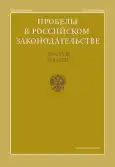On the Issue of Criminal Liability for Violation of Requirements for Anti-Terrorist Security of Facilities (Territories)
- Authors: Akkaeva H.A.1
-
Affiliations:
- North Caucasus Institute for Advanced Studies (branch) of the Krasnodar University of the Ministry of Internal Affairs of Russia
- Issue: Vol 17, No 4 (2024)
- Pages: 118-123
- Section: General theoretical, criminal-legal and other problems of Countering extremism and terrorism. Problems of preventing extremism and terrorism
- URL: https://journal-vniispk.ru/2072-3164/article/view/265249
- EDN: https://elibrary.ru/IMULMJ
- ID: 265249
Cite item
Abstract
The active transformation of terrorist-related criminal activities necessitates a timely and prompt response to the emergence of new challenges and threats, including in terms of improving the anti-terrorism protection of various objects and territories. Despite the fact that at present the stated problems are receiving close attention from government authorities, in practice many situations arise when the legislative requirements for anti-terrorism protection are ignored. In this context, it seems relevant to assess the effectiveness of existing measures of responsibility for such illegal behavior. The purpose of the presented study is the novelties of Russian legislation regulating criminal liability for violation of the requirements for anti-terrorist protection of objects (territories). The author comes to the conclusion that the analysis of the practical aspects of ensuring anti-terrorist protection clearly demonstrates a number of trends that negatively affect the effectiveness of the analyzed activities (ignoring on the part of the owners and owners of objects (territories) of certain legislative requirements; fragmented control activities carried out by competent departments, which aimed primarily at the planned format of implementation; weak effectiveness of preventive activities). The ineffectiveness of administrative responsibility provided for in Art. 20.35 of the Code of Administrative Offenses of the Russian Federation, due to minor legal consequences in the form of a fine for offenders, which contributes to the persistence of their illegal behavior. Attention is focused on the timeliness and validity of introducing criminal liability in this area, which will make it possible to attract the perpetrators in the event of repeated violations of legal requirements, as well as the occurrence of serious negative consequences.
Full Text
##article.viewOnOriginalSite##About the authors
Halimat A. Akkaeva
North Caucasus Institute for Advanced Studies (branch) of the Krasnodar University of the Ministry of Internal Affairs of Russia
Author for correspondence.
Email: akkaevah@mail.ru
SPIN-code: 1081-7564
Cand.Sci. (Law), Associate professor, Police Colonel, head of the department of special technical disciplines
Russian Federation, NalchikReferences
- Alborov D.A., Koryts S.I. Ensuring the protection of educational facilities // Law and Law. 2024. No. 1. pp. 37-41.
- Andreeva L.A., Kostygova A.A. Topical issues of anti-terrorist protection // Actual problems of jurisprudence: a collection of articles based on the materials of the LXXVII International scientific and practical conference, Novosibirsk, December 20, 2023. Novosibirsk: Siberian Academic Book LLC, 2023. pp. 75-79.
- Zadorozhny A.A. On certain aspects of increasing the anti-terrorist security of objects of mass visits of people // Eurasian Law Journal. 2023. No. 6(181). p. 378-380.
- Ivanov S.I. Corruption as a threat to the anti-terrorist protection of the tourist infrastructure of Crimea // Scientific notes of the V.I. Vernadsky Crimean Federal University. Legal sciences. 2023. Vol. 9, No. 3. pp. 461-467.
- Litvinov D.O., Litvinova N.A., Usoltsev V.I. Anti-terrorist activity in the shopping center // Technogenic and natural security. Disaster Medicine (safety-2023): Collection of scientific papers of the VII All-Russian Scientific and Practical Conference with international participation, Saratov, October 19-20, 2023. Saratov: LLC «Center for Social Agro-innovations of the SSAU», 2023. pp. 138-141.
- Teuvazhev Z.A. Some features of anti-terrorist protection // Law and management. 2024. No. 2. pp. 174-176.
- Technical systems of anti-terrorist and anti-criminal protection / O.V. Bagrintseva, Y.S. Nikitina, E.M. Abrosimova, D.A. Soshneva. Voronezh: Voronezh Institute of the Ministry of Internal Affairs of the Russian Federation, 2023. 128 p.
- Trufanov A.Yu. On problematic issues of categorizing objects in order to ensure their anti-terrorist protection // Actual problems of countering extremism and terrorism at the present stage : Collection of scientific articles of the I All-Russian Scientific and Practical Conference with international participation, Novosibirsk, February 17-18, 2022. Novosibirsk: Novosibirsk Military Institute named after General of the Army I.K. Yakovlev of the National Guard of the Russian Federation, 2022. pp. 227-233.
Supplementary files








